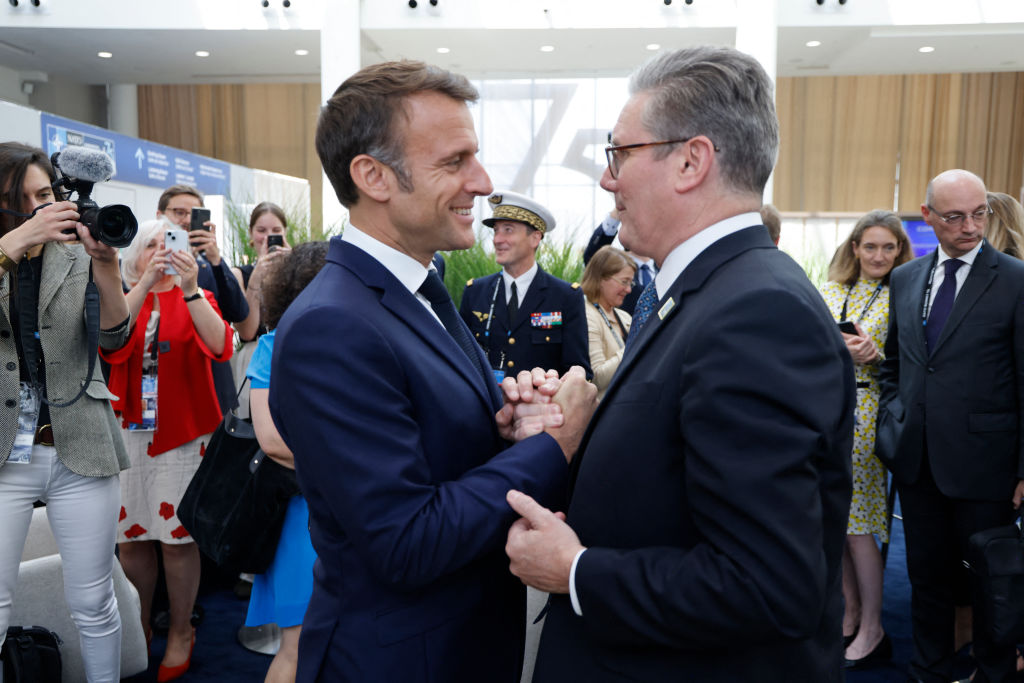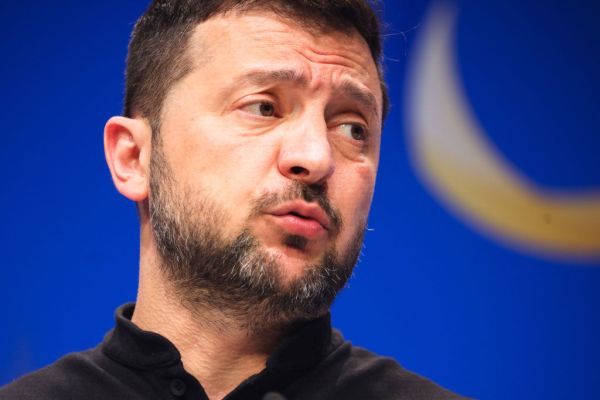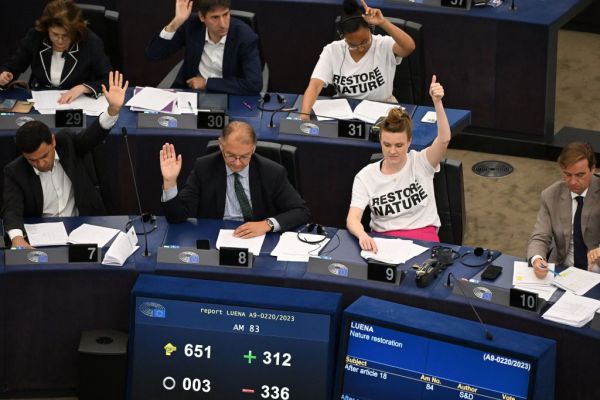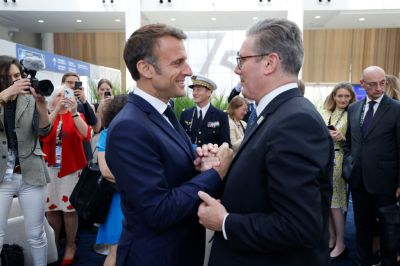The left saw major electoral victories in both France and the United Kingdom over the past two weeks. After 14 years of successive Conservative governments, whose track record left a lot to be desired, British voters decided that they had enough, flocking both to Labour and to the insurgent Reform UK party, led by Nigel Farage.
Following a catastrophic performance of his own party, Renaissance, in France’s European Parliament election, President Emmanuel Macron felt compelled to call a snap parliamentary election, in which most observers expected the far-right National Rally, once led by Marine Le Pen, to do well. Yet, through a combination of strategic voting and an alliance bringing together left-leaning parties, the left-wing coalition of Greens, center-left socialists, and hard left France Unbowed came first, defying expectations and creating a conundrum for President Macron.
What does the shift to the left mean for the U.K.’s and France’s places in Western alliances? The answer is much more straightforward in the British case, where the Labour Party now enjoys a comfortable parliamentary majority—making Sir Keir Starmer’s government less beholden to fringe voices on the left—and where party elites spent years preparing for the present moment.
In Foreign Affairs, the new foreign secretary, David Lammy, outlines the case for “progressive realism” as the basis for the new government’s foreign policy. Its logic commits the U.K. to using “realist means” in pursuit of “progressive ends”: “countering climate change, defending democracy, and advancing the world’s economic development.”
Very little about this approach is actually new, but it is refreshing to see the British left move beyond a knee-jerk distrust of hard power and the trauma of former Labour Prime Minister Tony Blair’s support for the war in Iraq. “Inaction has high costs, too,” Lammy writes, citing President Barack Obama’s failure to police the U.S.’s own redline against the use of chemical weapons in Syria. Lammy also recognizes that in China the “state became more repressive as the economy opened up.”
Again, none of this represents a departure from a long-standing tradition of liberal internationalism that figures such Lammy share with moderate Democrats in the United States, or with mainstream social democrats and liberals across the EU. Brexit notwithstanding, the successive Tory governments have not really departed from the same general view of the world either—not even under the seemingly disruptive premiership of Boris Johnson. One can thus expect more continuity than change: The U.K. will continue to help Ukraine; it will prioritize its relationship with the United States, oftentimes flavored with a hint of neediness around its “special” character; and will continue to be committed to multilateralism on subjects such as climate change.
Even the changes of emphasis will be minor. Expressing a desire to play a larger role in European affairs and “reset” its relationship with the European Union, the U.K. will host this week’s summit of the European Political Community, a forum that allows it to engage with the EU and other European nations. Tory governments, too, were keen to use the summit as a springboard for its influence on the continent—especially on questions related to Ukraine and Eastern Europe more broadly. The binding constraint on British influence, both in Europe and in more distant theaters where the U.K. seeks to play a role (think AUKUS), is its economic weight and the resources available to its armed forces. Those have run thin under Conservative governments; whether Labour’s sprawling spending priorities will allow for a real military buildup remains to be seen.
The picture from the other side of the English Channel is far more uncertain. While the U.K. is a non-EU member trying to play a larger role in European affairs, France is a core EU state seemingly headed for a period of political dysfunction that will thwart Macron’s ambitions to establish France as Europe’s central player, filling the void left by Germany’s lethargic leadership.
For every article by David Lammy in Foreign Affairs, there are several Economist interviews in which Macron sketches out his strategic thinking, aimed at turning Europe into a superpower—obviously, with France at its helm.
Since his 2023 speech at a global security summit in Bratislava, Slovakia, Macron has made a deliberate effort to position France as an active player on NATO’s Eastern flank. In that speech, he expressed regret that the West had “sometimes missed opportunities to listen” to Eastern European warnings about Russia and promised to take their concerns more seriously. In the months that followed, France’s policy changed too, becoming much more outspoken in its support of Ukraine.
Unlike German Chancellor Olaf Scholz, Macron has not shied away from controversial ideas, such as floating the possibility of deploying NATO troops in Ukraine. France has also joined the ranks of countries sending fighter jets—the Dassault Mirage 2000-5—to Ukraine. One may agree or disagree with the policy specifics, but Macron has stood out especially in the Western European context as a figure who thinks about Europe’s security and the transatlantic relationship strategically and with an appreciation of the looming political realities of the ever more likely second Trump administration.
Yet, unlike the U.K., France now lacks a viable governing majority. Its new legislature is split, roughly speaking, between a hard left-led bloc, a populist-nationalist bloc, and Macron’s centrist-technocratic coalition. A legislative majority eschewing the extremes would span from the Greens, through the Socialists and Macron’s Renaissance party, to the center-right Republicans, bringing along a number of smaller mainstream factions. Given that France has no real experience with coalition politics, such a scenario seems farfetched. What is more likely is a fragile minority cabinet, perhaps a technocratic one, which will try to find votes for its legislation in an ad hoc fashion.
The French constitution is deferential to the president on matters of foreign and defense policy. But just like in the U.K., the biggest obstacle to France’s helping Ukraine, or simply projecting power, is the state of its economy. With growth expected below 1 percent and little prospect of bolder structural reforms getting through in the final years of Macron’s presidency, it will be difficult to fund the military buildup that France needs as it responds to the worsening security situation in Europe.
In the immediate future, Europe and the EU might thus face a paradox: A country that has just left the bloc is keen to do more on the continent, while the EU’s two central players—France and Germany—are increasingly paralyzed and inward-looking. Together with the prospect of another Trump presidency, this will present some European governments with an intractable challenge—particularly those that were used to taking their strategic cues from Berlin, Paris, or Washington. To expect Westminster alone to fill that void seems a bridge too far, but here is to hoping that Sir Keir and Mr. Lammy will be part of the solution, rather than add to the problems of Europe’s security.






Please note that we at The Dispatch hold ourselves, our work, and our commenters to a higher standard than other places on the internet. We welcome comments that foster genuine debate or discussion—including comments critical of us or our work—but responses that include ad hominem attacks on fellow Dispatch members or are intended to stoke fear and anger may be moderated.
With your membership, you only have the ability to comment on The Morning Dispatch articles. Consider upgrading to join the conversation everywhere.